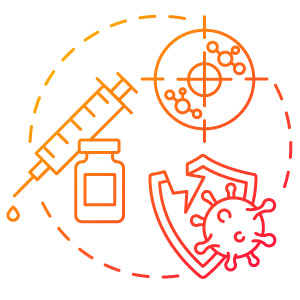 Vaccinations and boosters: How effective are they against preventing serious illness or death? What about reinfections? New variants? Two years into the pandemic, there are still so many questions that need answers.
Vaccinations and boosters: How effective are they against preventing serious illness or death? What about reinfections? New variants? Two years into the pandemic, there are still so many questions that need answers.
PEF scientists in Albany are hard at work every day conducting research to find those answers.
One recent study addresses the extent to which vaccine effectiveness is declining and whether these changes are due to waning immunity or other factors. The vaccine effectiveness study, when published by the New England Journal of Medicine, was the largest study by vaccine type and timing in the nation.
“It required a collaborative effort spanning a multitude of expertise across the Department of Health,” said PEF research scientist Vajeera Dorabawila, who joined PEF in 2007 and is currently the co-director of the Bureau of Surveillance and Data Systems for DOH. “During COVID-19, my team and I have been heavily involved in work spanning statewide case and contact tracing, micro-cluster strategies, primary data collection and reporting. This includes contributing to the vaccine effectiveness studies, as well as newer bodies of research, like the department’s work in analyzing COVID-19 reinfections.”
“The research done by PEF scientists at the Department of Health informs public health officials as they establish policies to combat COVID-19 across the nation,” said PEF President Wayne Spence. “The union utilizes the work of our brothers and sisters to keep members informed of the latest information about vaccinations and the virus.”
Dorabawila and her team use advanced statistics to study and analyze public health challenges and opportunities. Prior to coming to DOH, Dorabawila was assistant director for Research, Evaluation and Performance Analytics at the Office of Children and Family Services (OCFS). In that role, she oversaw OCFS flagship reports, federal reporting and data warehouse reporting in both child welfare and juvenile justice.
The vaccine effectiveness study was conducted over six to eight weeks.
“It was interesting in that we compared data of adults who were vaccinated in January through April 2021 and examined their levels of new diagnosed infections and hospitalizations from May to August 2021,” Dorabawila said. “We were then able to compare this group of fully vaccinated adults to unvaccinated adults – those who had never received a vaccine.”
There was much to learn from studying the vaccines’ effectiveness.
“This study used real-world data to inform real-world understanding, underscoring the importance of vaccination and also highlighting the impact of a new and circulating variant, at the time the Delta variant,” Dorabawila said. “With every study we have done in which we leverage our vaccine effectiveness methodology, we see time and time again that the COVID-19 vaccines provide meaningful protection against severe COVID-19. Additionally, as protection offered by a primary series declines over time, that is where boosters come in and more research on this is necessary.”
The study proved critical to understanding the importance of vaccinations as a protection against severe disease and is a valuable resource for planning response to COVID.
“This study was available to public health leaders and policy-makers nationwide,” Dorabawila said. “With more data comes more clarity around the solutions and tools we need to deploy to protect and promote the public health of our communities.
“As the pandemic evolves and as new variants emerge, new questions arise,” she said. “Continued rigorous research to inform public health decision-making is critical to protecting our communities. I am grateful to be in this role, at this department, where this commitment is realized each and every day.”
For fact sheets compiled by the PEF Health and Safety Department, click here.
Editor’s Note: Members interested in the study findings who want to learn more, can check out this press release from the New York State Department of Health.

